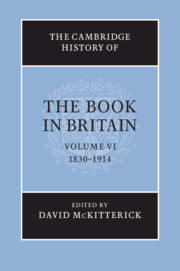Book contents
- Frontmatter
- Introduction
- 1 Changes in the look of the book
- 2 The illustration revolution
- 3 The serial revolution
- 4 Authorship
- 5 Copyright
- 6 Distribution
- 7 Reading
- 8 Mass markets: religion
- 9 Mass markets: education
- 10 Mass markets: children’s books
- 11 Mass markets: literature
- 12 Science, technology and mathematics
- 13 Publishing for leisure
- 14 Publishing for trades and professions
- 15 Organising knowledge in print
- 16 The information revolution
- 17 A place in the world
- 18 Second-hand and old books
- 19 A year of publishing: 1891
- 20 Following up The reading nation
- Bibliography
- Index
- Plate Sections
- References
14 - Publishing for trades and professions
Published online by Cambridge University Press: 28 March 2010
- Frontmatter
- Introduction
- 1 Changes in the look of the book
- 2 The illustration revolution
- 3 The serial revolution
- 4 Authorship
- 5 Copyright
- 6 Distribution
- 7 Reading
- 8 Mass markets: religion
- 9 Mass markets: education
- 10 Mass markets: children’s books
- 11 Mass markets: literature
- 12 Science, technology and mathematics
- 13 Publishing for leisure
- 14 Publishing for trades and professions
- 15 Organising knowledge in print
- 16 The information revolution
- 17 A place in the world
- 18 Second-hand and old books
- 19 A year of publishing: 1891
- 20 Following up The reading nation
- Bibliography
- Index
- Plate Sections
- References
Summary
When publication of the Oxford English dictionary reached the entry for ‘profession’, readers were reminded of Addison writing in the Spectator in 1711: that the word had referred specifically to ‘the three learned professions of divinity, law, and medicine’. As three central subjects of the early sixteenth-century curriculum at the ancient universities they were manifestly inadequate as an aid to definitions even in the eighteenth century. The concept of the professional not simply as distinct from the amateur, but, more importantly, as pertaining to those who lived by their professional skills, implied certain kinds of education. In 1828, John Leslie, Professor of Natural Philosophy at Edinburgh, published a slim handbook Rudiments of plane geometry, ‘designed chiefly for professional men’. Anxious to ‘connect the ancient with the modern discoveries’, and fearful of the inadequacies of the fifth book of Euclid as it was usually taught, he further included a summary of some of the principles of plane trigonometry for the use of surveyors. This profession was certainly not new. Much more important – for many others quite apart from Leslie – was the contemporary need for mathematical competence among those brought up on a diet of ancient languages. Leslie spoke from the academy, and from Edinburgh rather than Oxford or Cambridge. At Trinity College Dublin, professional students were defined in the late 1860s as those studying medicine, divinity, law and – a mid-century reform – engineering. Other commentators spoke from the street. Charles Knight, with his tongue partly in his cheek, wrote of thieving as a profession.
Keywords
Information
- Type
- Chapter
- Information
- The Cambridge History of the Book in Britain , pp. 500 - 530Publisher: Cambridge University PressPrint publication year: 2009
